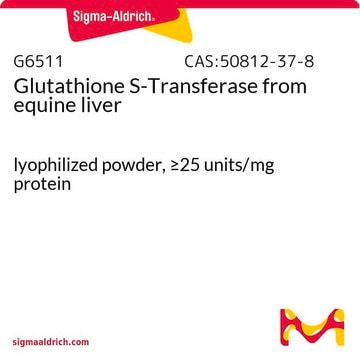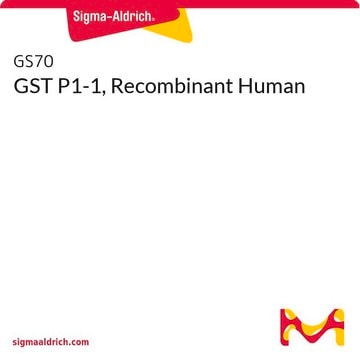Összes fotó(1)
Fontos dokumentumok
G5663
Glutathione S-Transferase from E. coli
recombinant, expressed in E. coli, buffered aqueous solution
Szinonimák:
Glutathione S-alkenetransferase, Glutathione S-alkyltransferase, Glutathione S-aralkyltransferase, Glutathione S-aryltransferase, Glutathione S-epoxidetransferase, RX: Glutathione R-transferase
Bejelentkezésa Szervezeti és Szerződéses árazás megtekintéséhez
Összes fotó(1)
About This Item
Javasolt termékek
rekombináns
expressed in E. coli
grade
for molecular biology
Forma
buffered aqueous solution
molekulatömeg
26 kDa
koncentráció
>0.1 mg/mL
>1 unit/mL
UniProt elérési szám
kiszállítva
wet ice
tárolási hőmérséklet
2-8°C
Géninformáció
human ... GSTM1(2944)
Általános leírás
Glutathione S-transferase (GST) catalyzes the addition of the glutathione thiol group to a suitable electrophilic species. Enzymatic activities are based on the conjugation of reduced glutathione in the presence of a second substrate.
Egyediség
Glutathione S-transferase (GST) catalyzes the addition of the glutathione thiol group to a suitable electrophilic species. Enzymatic activities are based on the conjugation of reduced glutathione in the presence of a
second substrate.
In ELISA, 0.5 μg of recombinant glutathione S-transferase is the minimum detectable level of enzyme with an anti-glutatione S-transferase, alkaline phosphatase conjugate.
In immunoblot, 50 ng of recombinant GST is the minimum detectable level of enzyme with an anti-glutathione S-transferase, alkaline phosphatase conjugate.
second substrate.
In ELISA, 0.5 μg of recombinant glutathione S-transferase is the minimum detectable level of enzyme with an anti-glutatione S-transferase, alkaline phosphatase conjugate.
In immunoblot, 50 ng of recombinant GST is the minimum detectable level of enzyme with an anti-glutathione S-transferase, alkaline phosphatase conjugate.
Alkalmazás
Glutathione S-Transferase (GST) from E. coli has been used in the standard curve preparation for the quantification of GST-V5H6 produced by enzyme-linked immunosorbent assay (ELISA).
Suitable for use in ELISA and Western blot applications.
Biokémiai/fiziológiai hatások
Glutathione S-transferases (GST) catalyzes the conjugation of reduced glutathione with several substrates, which leads to detoxification. It also serves as transport proteins.
Figyelmeztetés
Due to the sodium azide content, consult the SDS for information regarding hazards and safe handling practices.
Egység definíció
One unit will conjugate 1.0 micromole of 1-chloro-2,4-dinitrobenzene with reduced glutathione per minute at pH 6.5 at 25 deg C.
Fizikai forma
GST is supplied as a solution in phosphate buffered saline containing 0.02% sodium azide. Every lot of material supplied will have 5 mg total enzyme, at a concentration greater than 0.1 mg/ml, typically 1.0 mg/ml.
Tárolási osztály kódja
12 - Non Combustible Liquids
WGK
nwg
Lobbanási pont (F)
Not applicable
Lobbanási pont (C)
Not applicable
Válasszon a legfrissebb verziók közül:
Már rendelkezik ezzel a termékkel?
Az Ön által nemrégiben megvásárolt termékekre vonatkozó dokumentumokat a Dokumentumtárban találja.
Az ügyfelek ezeket is megtekintették
Niroshan Ramachandran et al.
Methods in molecular biology (Clifton, N.J.), 328, 1-14 (2006-06-21)
Protein microarrays are a miniaturized format for displaying in close spatial density hundreds or thousands of purified proteins that provide a powerful platform for the high-throughput assay of protein function. The traditional method of producing them requires the high-throughput production
Clinical pathology in non-clinical toxicology testing
Haschek and Rousseaux's Handbook of Toxicologic Pathology, 565-594 (2013)
Living recombinant Saccharomyces cerevisiae secreting proteins or peptides as a new drug delivery system in the gut
Blanquet S, et al.
Journal of Biotechnology, 110(1), 37-49 (2004)
Single-step purification of polypeptides expressed in Escherichia coli as fusions with glutathione S-transferase
Smith D B and Johnson K S
Gene, 67(1), 31-40 (1988)
G Garrait et al.
Metabolic engineering, 11(3), 148-154 (2009-04-07)
An innovative "biodrug" concept based on oral administration of living recombinant microorganisms as a vehicle to deliver active compounds directly into the digestive tract has recently been developed. To validate this concept, we studied a recombinant Saccharomyces cerevisiae strain in
Tudóscsoportunk valamennyi kutatási területen rendelkezik tapasztalattal, beleértve az élettudományt, az anyagtudományt, a kémiai szintézist, a kromatográfiát, az analitikát és még sok más területet.
Lépjen kapcsolatba a szaktanácsadással






